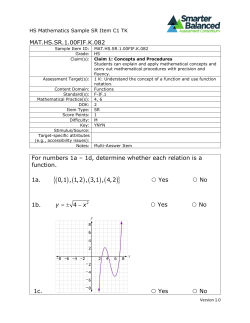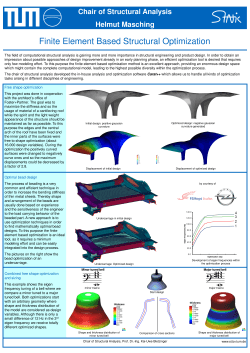
Decision Making Theory
Decision Making Theory Lecturer: Davydov Ivan Alexandrovich, C.Sc. Turn: 3 Duration: 18 weeks Workload (h): 108 Presence (h + CH): 64 (8) Self-Study (h): 36 Contents: The course is to introduce basic mathematical models and to master solution algorihms of discrete extremum problems as well as to review of modern approaches of the decision making theory. The content of the Course is focused on development of skills to formulate optimisation task, categorize it, define computational complexity and choose/find the most appropriate solution method, articulate it as algorithm or program. Background and relations to other courses: basics of Operations Research (optimization methods), Discrete Mathematics, Algorithm Theory, Mathematical Logic. Main topics and learning objectives: Themes Learning objectives Scope and method of decision making theory To know Basic concepts and definitions, mathematical models of classical problems of analysis of operations, numerical methods and solution approaches Dynamic programing To be able to properly lay down applied tasks in the form of mathematical (simulation) model Knapsack problems To be able to choose appropriate solution and put it into practice in the form of algorithms and programs Approximate algorithms To know Basics of theory of algorithm of combinatorial optimization and computational complexity Scheduling theory To be able to duly operate commercial software to solve specific discrete optimization tasks (GAMS, CPLEX etc.) Matrix game theory To manage common numerical methods of solutions of discrete optimization tasks Computational complexity To know Elements of complexity theory to analyze NP tasks The Matroid theory To manage theory of algorithm of solving problems of arrangement, making out a schedule, calendar scheduling, game theory, cutting and packing problems, routing Assessment: Formative: Workshops evolve practicum on acquiring skills of modeling of complex production and economic problems in the form of optimization problems in the field of modern software as GAMS and of solution algorithm working out by the means of such software. Summative: Number and Type; Connection to Course Duration Part of final mark in % Oral Exam 90 min 100% Learning outcomes: Academic: To know modern approaches to solve challenges in the theory of decision making. To manage theory of algorithm of solving problems of arrangement, making out a schedule, calendar scheduling, game theory, cutting and packing problems, routing. Prerequisites for Credit Points: The credit points will be granted when the course has been successfully completed, i.e. all parts of the examination are passed.
© Copyright 2025





















